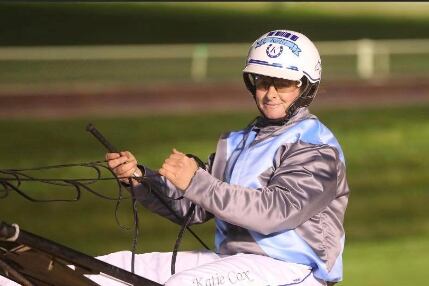
CANTERBURY HARNESS-RACING STAR KATIE COX LOSES BATTLE WITH AGGRESSIVE, RARE LUNG CANCER
Top Kiwi harness-racing driver Katie Cox has lost her battle with lung cancer.
She died yesterday, aged 34.
The Herald revealed last year that Cox had been diagnosed with an aggressive form of lung cancer - one which primarily affects young female non-smokers.
The news came after Cox, from Leeston near Christchurch, went to the doctor for antibiotics for an ongoing cough.
Upon learning about Cox’s condition, her colleagues in the harness-racing community launched a fundraising effort to help her pay for treatment that was not publicly funded.
More than $130,000 was raised.
She started the treatment, but sadly was not able to beat the cancer.
Cox’s mother Wendy share the tragic news last night, in a letter posted to social media by well-known racing commentator and personality Craig “Wiggy” Wiggins.
“It’s with the deepest regret and sadness that I post this to you all. Our kind, beautiful lady has driven her last race,” he said.
Wendy’s letter read: “It is with the heaviest of broken hearts our loved Katie passed away peacefully this morning.
“She approached cancer and the myriad of drugs she took to get through this with determination, integrity and tenacity.
“Katie was still managing to drive horses at home with the help of her great support team, however the high dose steroids she was on to deal with the drug toxicity in her lungs showed a form of pneumonia on Monday from the blood test and CT scan.
“That night she started on strong antibiotics and knew the next four days were going to be difficult to get through.
“As determined as she was, and being on direct oxygen and concentrators, her lungs struggled with getting enough oxygen and she passed away peacefully this morning.”
Wendy said her daughter’s spirit was “willing” to the end - and she was even giving directives about her horse Spy Da Moment’s training “as she was entering the ambulance”.
“Katie was so appreciative of the fantastic support from all who knew her, and supporters she hadn’t even met,” she continued.
“A date will be announced for a memorial to Katie’s life ... and as per her request not on a trials or race day.”
Wiggins wanted to thank everyone who had supported Cox since her diagnosis was shared.
“She brought the whole harness-racing industry together - and we’re better and stronger for her influence,” he told the Herald.
Wiggins said Cox attended Friday’s Addington meeting to watch her horse Spy Da Moment take the track.
“It came second, it almost won,” he said.
“That night she was pretty positive ... it happened really quickly.”
When he broke the news last night, Wiggins - a staunch mental health advocate - urged those affected by Cox’s death to support each other.
“We know this is a shock to you all and the hurt will be deep and the loss you feel real,” he said.
“Katie brought us all together in her journey and it’s important that we all support each other and her closest the most.
“Please if you’re on track this week wear a blue and white armband in recognition of her racing colours. Black if you want - but let’s do her proud!”
Soon after Cox began her treatment, she posted an update for her supporters.
“I have started on my first treatments this week and all is going well so far. Hopefully, the results will be excellent from this medication,” she wrote.
She described her shock diagnosis as “an unbelievable few weeks with many a learning curve”.
She said she currently felt “strong, fit and healthy” and the cancer was detected at her first visit to the doctor “in years”.
She’d had a cold and a cough that lingered and “some antibiotics seemed very sensible”.
“After a second prescription, a local and proactive young doctor to whom I am very grateful to suggested an x-ray,” she explained.
“This came back to everyone’s surprise showing a collapsed lung, and so a bronchoscopy followed for a biopsy, then a CT scan, followed by a PET/CT scan.”
She said she was still “feeling absolutely fine except for the niggling cough” when she got her results.
“The first diagnosis was Adenocarcinoma – or non-small cell lung cancer and quite treatable,” she said.
Further results showed she had a genetic mutation known as Exon 20 - which accounts for up to approximately one in 30 lung cancers.
Exon 20 mutations are resistant to drugs used to treat other forms of lung cancer.
Cox said she had made contact with a “great international professional advice network” for Exon 20 on the latest drug trials and drugs about to be released.
“Along with the great specialist I am seeing, a good fighting spirit and time for research, I am aiming for positive progress,” she said.
Anna Leask is a Christchurch-based reporter who covers national crime and justice. She joined the Herald in 2008 and has worked as a journalist for 18 years with a particular focus on family violence, child abuse, sexual violence, homicides, mental health and youth crime. She writes, hosts and produces the award-winning podcast A Moment In Crime, released monthly on nzherald.co.nz
2024-07-03T21:23:19Z dg43tfdfdgfd